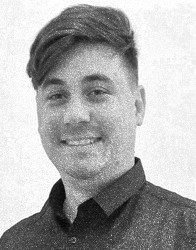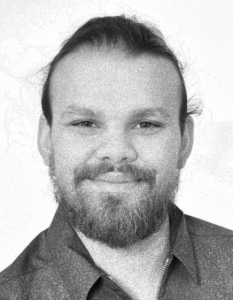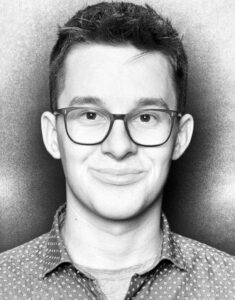The JAACS is the Alumni Association of the three Computer Science Institutes INF, IIUN and DIUF of the Universities of Bern, Neuchâtel, and Fribourg. More information about the association and how to register can be found at https://www.jointalumni.ch/admission.
The JAACS annually awards a prize for the best Bachelor, Master, and Doctoral thesis at the INF, IIUN and DIUF that was defended during the academic year. The winners are selected by the respective institutes and are presented the award at the institute’s end-of-year event.
 |
PhD
Dr. Allan M. de Souza, “Towards a Personalized Multi-objective Vehicular Traffic Re-routing System” INF, Bern |
Abstract
Vehicular traffic re-routing is the key to provide better vehicular mobility. However, considering just traffic-related information to recommend better routes for each vehicle is far from achieving the desired requirements of a good Traffic Management System (TMS), which intends to improve mobility, driving experience, and safety of drivers and passengers. In this scenario, context-aware and multi-objective re-routing approaches will play an important role in traffic management, considering different urban aspects that might affect path planning decisions such as mobility, distance, fuel consumption, scenery, and safety. There are at least three issues that need to be handled to provide an efficient TMS, including: (i) scalability; (ii) re-routing efficiency; and (iii) reliability. Scalability refers to the ability of the system to deliver the desired performance without carrying about the vehicles’ number or the scenario’s size. On the other hand, re-routing efficiency refers to how good is the traffic management of the solution. Finally, reliability determines how reliable the system computes the routes regarding future changes in the urban dynamics.
In this way, this thesis contributes to efficient and reliable solutions to meet future TMSs. The first contribution lies in developing a scalable architecture for traffic management based on distributed and cooperative algorithms for sensing the urban environment, estimating urban aspects, and re-routing vehicles in real-time. The second contribution relies on enabling an efficient multi-objective re-routing based on each user’s preferences. Thus, each user can determine which urban aspects will be chosen to plan its route. Unlike other multi-objective approaches, our solution is non-deterministic, which decreases the chance of creating additional congestion spots since vehicles with similar origin and destination potentially will be re-routed through different routes. This thesis’s last contribution lies in improving the reliability of the routes computed by the TMSs using a route planning algorithm that considers the future changes in the urban dynamics is proposed. The significant advantage of this solution regarding literature solutions is that the system predicts future urban dynamics (i.e., future changes in traffic conditions, safety risks, etc.). Thus, the system knows beforehand when some changes will happen and how long they will last, consequently computing more reliable routes.
The proposed solutions were widely compared with other related works on different performance evaluation metrics. The evaluation results show that the proposed solutions are efficient, scalable, and cost-effective, pushing forward state-of-the-art traffic management systems.
Laudatio
llan developed and evaluated a scalabale vehicular traffic management system, not only optimizing travel time but also addressing the safety of travelers. Dynamic re-routing was supported , considering multiple objectives. The system makes use of reinforcement learning and has been evaluated using rich safety and mobility data sets from cities all over the world. The thesis was performed under a joint-supervision doctorate program between University of Campinas (Unicamp) and University of Bern and resulted in a good number of publications at conferences and top journals.
Link
https://boris.unibe.ch/156641/
 |
Master
David Lehnherr “A Logic of Interactive Proofs” INF, Bern |
Abstract
We introduce the probabilistic two-agent justification logic IPJ, a logic in which we can reason about agents that perform interactive proofs. In order to study the growth rate of the probabilities in IPJ, we present a new method of parametrizing IPJ over certain negligible functions. Further, our approach leads to a new notion of zero-knowledge proofs.
Laudatio
In his master thesis, David Lehnherr has developed a new logic very independently. To do this, he had to familiarize himself with a wide variety of topics (epistemic logic, non-standard probabilities, interactive proofs) and skillfully link them together. He developed his own approaches and ideas very quickly, which finally led to the goal of a logical formalisation and analysis of interactive proofs.
Link
n/a
 |
Bachelor
Olivier Stähli “Deep Learning in the Wild – Entwicklung eines AI-basierten, bioakustischen Wolf-Monitoring-Systems” INF, Bern |
Abstract
Wolves are spreading in the Alpine region with increasing speed. It is difficult to find out how many individuals are in an area, if they have cubs and where their territory is located.
In this bachelor thesis, we try to automate the detection method of passive acoustic monitoring by using a Deep Learning Algorithm of the family of Convolutional Neural Networks (CNN), which detects the howling of the animals, and an embedded system, which provides the real-time analysis. In this way, we aim to make a small contribution to a better coexistence of wolves and humans.
We constructed eight prototypes and tested them in an animal park and in three wolf territories. With these tests, we were able to achieve a proof of concept and thus lay the foundation for a low-cost, large-scale, automated wolf monitoring method.
Laudatio
For his bachelor thesis, Olivier Stähli did not only design and train a neural network to detect howl of wolves, he also build hardware prototypes in which the system is embedded and deployed them in the wild.
Thus he was able to show in practice that his system delivers better results than all existing approaches.
Link
n/a